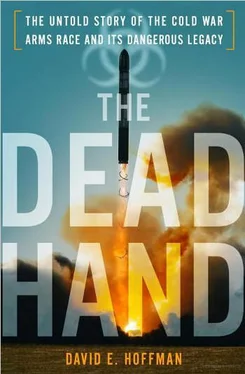Reagan recalled he wanted to spend the day by the White House pool. Instead, he sat in his damp trunks on a towel in his study rewriting a speech on a legal pad. The Osipovich tape had become a powerful propaganda bludgeon. Reagan said he rewrote the speech to “give my unvarnished opinion of the barbarous act.” During the address that evening, Reagan played part of the tape. “The 747 has a unique silhouette unlike any other plane in the world,” Reagan said. “There is no way a pilot could mistake this for anything other than a civilian airliner.” Reagan acknowledged there was an RC-135 in the air that night, but dismissed the possibility of confusion over it, saying it was back on the ground “for an hour when the murderous attack took place…”
Reagan added, “And make no mistake about it—this attack was not just against ourselves or the Republic of Korea. This was the Soviet Union against the world and the moral precepts which guide human relations among people everywhere. It was an act of barbarism, born of a society which wantonly disregards individual rights and the value of human life and seeks constantly to expand and dominate other nations.”
While Reagan and Shultz were shaking their fists at Soviet brutality, within two days U.S. intelligence agencies had concluded the whole thing was probably an accident. At the CIA, Douglas MacEachin, deputy director of the operations center, had been on vacation in Boston, and rushed back to headquarters. Using large maps, he and others spent hours charting every known fact about the stray airliner, including the radio intercepts. Within a few hours, MacEachin recalled, they decided the Soviets had made a mistake, the same conclusion air force intelligence had also reached. 9In fact, the Soviets had not been sure what the airliner was, and had probably confused it with the American RC-135. 10
The deputy CIA director, Robert M. Gates, later disclosed that this conclusion had been mentioned in the President’s Daily Brief—his morning intelligence report—on September 2. But some officials, he said, “just got carried away.” 11
Andropov learned of the shoot down early on the morning of September 1, while he was still at home on the outskirts of Moscow. He was told that a U.S. warplane had been downed over Sakhalin. He knew the rules: if a foreign plane was detected in Soviet airspace, the intruder must be given a visual or radio signal ordering it to land on Soviet territory, and if ignored, the nearest border command post could order the plane destroyed. It had happened before. According to Dmitri Volkogonov, the historian, the practice was always to deny a shoot down: “It came down by itself.” 12
At the Kremlin later in the day, just before a Politburo meeting, Defense Minister Dmitri Ustinov approached Andropov and told him, “A plane’s been shot down. It turned out not to be American, but South Korean, and a civil aircraft, at that. We’ll find out more and report in greater detail.” Volkogonov said Andropov clearly had other sources of information, and replied, “Fine. But I was told there’d been a spy plane above Kamchatka. I’m flying to the Crimea later today after the meeting. I must have a rest and get some treatment. As for the plane, you sort it out.”
Dobrynin recalled seeing Andropov that day. Looking haggard and worried, Andropov ordered Dobrynin to rush back to Washington to deal with the crisis, saying, “Our military made a gross blunder by shooting down the airliner and it probably will take us a long time to get out of this mess.” Andropov called the generals “blockheads” who didn’t understand the implications of what they had done. Dobrynin said Andropov “sincerely believed,” along with the military, that the plane had made an intrusion into Soviet airspace as part of an intelligence mission to check Soviet radars. But even that, Andropov said, was no excuse for shooting it down instead of forcing it to land. 13
After the three-hour Politburo meeting, Andropov went on holiday to Simferopol, where he stayed at one of several luxury villas reserved for the Soviet leadership. Accompanying him was not only his usual staff, but an entire medical facility. At this point, Konstantin Chernenko, long a weak acolyte of Brezhnev, took over running the Politburo meetings. Andropov never returned to the table.
Dobrynin said Andropov “was actually ready to admit the mistake publicly” but was talked out of it by Ustinov. The Soviet reaction was to lie about the events and cover up. The first bulletin from TASS on September 1 did not even mention the plane being shot down:
An unidentified plane entered the air space of the Soviet Union over the Kamchatka peninsula from the direction of the Pacific Ocean and then for the second time violated the air space of the USSR over Sakhalin Island on the night from August 31 to September 1. The plane did not have navigation lights, did not respond to queries and did not enter into contact with the dispatcher service.
Fighters of the anti-aircraft defense, which were sent aloft toward the intruder plane, tried to give it assistance in directing it to the nearest airfield. But the intruder plane did not react to the signals and warnings from the Soviet fighters and continued its flight in the direction of the Sea of Japan. 14
The Politburo met again September 2, with Chernenko presiding. The Soviet rulers circled the wagons, and worried about whether to even admit the plane had been shot down. Foreign Minister Andrei Gromyko said he favored admitting that shots were fired but to insist “that we acted legally.” Defense Minister Ustinov then told the group, “I can assure the Politburo that our pilots acted in complete conformity with the requirements of their military duty, and everything stated in the submitted memorandum is the honest truth. Our actions were absolutely correct, insofar as the American-built South Korean aircraft flew 500 kilometers into our territory. It is extremely difficult to distinguish this aircraft by its shape from a reconnaissance aircraft. Soviet military pilots are prohibited from firing on passenger aircraft. But in this situation their actions were perfectly justified because in accordance with international regulations the aircraft was issued with several notices to land at our airfield.”
Mikhail Gorbachev, a younger, rising star among the aging Politburo members, said, “The aircraft remained above our territory for a long time. If it went off track, the Americans could have notified us, but they didn’t.”
Ustinov claimed the Korean aircraft had no lights. After firing warning shots, he said, the Soviet pilot “informed the ground that the aircraft was a combat one and had to be taken down.”
Gromyko: “We cannot deny that our plane opened fire.”
Viktor Grishin, then the Moscow party first secretary, asked, “And what was the South Korean pilot saying?”
Ustinov: “We didn’t hear anything.”
The KGB chief, Viktor Chebrikov, described the sea search, in waters up to 328 feet deep; Soviet ships and Japanese fishing vessels were in the area. “This means they can raise the plane’s black box, and we can too,” said Gromyko. The others worried aloud that evidence of a deliberate shoot down would come out. Gorbachev asked whether the Americans had detected the actual firing of the Soviet interceptor.
Chebrikov: “No, they haven’t. But I want to re-emphasize that our actions were entirely legitimate.”
Nikolai Tikhonov, a Brezhnev man and chairman of the Council of Ministers, said, “If we acted correctly, legitimately, then we have to say straight out that we shot this plane down.”
Gromyko: “We have to say that shots were fired. This should be said straightforwardly, to prevent our adversary from accusing us of deception.”
Читать дальше












